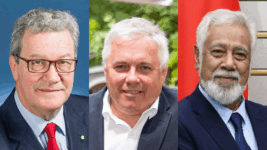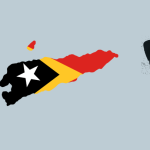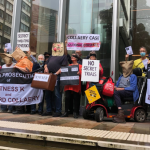Rex Patrick on Why National Archives Denials Are Preventing Reconciling with Timor-Leste: Interview

Former Australian Senator Rex Patrick is to appeal a decision of the National Archives of Australia to the Administrative Review Tribunal (ART), as the NAA denied his 1 January 2025 request for 2004 documents “that relate to ASIS intelligence collection activities and operations relating to the government of Timor Leste and maritime boundary negotiations between Australia and Timor Leste”.
The NAA denied Patrick’s request, advising the director of Transparency Warrior, that it neither confirms nor denies the existence of any documents related to this on the Commonwealth record, but in assuming there were, it wouldn’t be handing them over anyway, as they could “cause damage the security, defence or international relations of the Commonwealth”.
Patrick is to put to the ART that the NAA decision doesn’t stack up. The reason for this is there have been dozens of public recognitions, confirming that the Howard government had ASIS agents bug the ministerial offices of the newly established nation of Timor Leste in 2004, to gain an advantage in negotiations over fossil fuel deposits positioned between the nations underwater in the Timor Sea.
Recently having travelled to Dili, the capital of Timor Leste, to meet with prime minister Xanana Gusmao, Patrick is attempting to see the Australian government release the documents that provide the final confirmation of the 2004 bugging operation, so that Australian civil society and the federal government can engage on the matter, with a view to ultimately making amends with Timor Leste.
Very dirty business
Patrick stresses that when then Australian foreign minister Alexander Downer allegedly oversaw the bugging of Timor Leste, the two-year-old nation was extremely impoverished, after brutal Indonesian colonisation, following the Portuguese colonisers pulling out of Timor Leste in 1975, and Jakarta imposing its rule via an invasion that triggered the 25 year Fretilin independence movement.
The account of the historical relations between Australia and Indonesia that Patrick has this week provided in an article in Michael West Media goes a step further than other recent accounts as he points out that the Whitlam government had been plotting with Jakarta to divvy up the oil and gas reserves that would be within the territorial waters of an independent Timor-Leste in the mid-1970s.
The former senator further outlines that our nation is currently screwing the Timorese over once again, because that nation is now interested in processing its own gas from the underwater deposits, rather than continue to send the fossil fuel to Australia for processing. So, this country could help its neighbour in developing this capability, but because it refuses, China is stepping in to assist.
Sydney Criminal Lawyers spoke to Transparency Warrior Rex Patrick about why it is way over time for the Australian government to come clean, acknowledge the incident occurred and apologise, how taking the archive request to the tribunal will make it more likely that a rational decision is come to, and why this nation should be making amends with a small island nation not far from its shores.

You’re well known for your freedom of information requests to the federal government, which ultimately reveal official wrongdoing, and at present the National Archives of Australia has twice denied your request to access documents relating to the alleged espionage our government engaged in in Timor Leste in 2004, when ASIS bugged its government offices.
Mr Patrick, as you say, everybody knows Australia did conduct the 2004 bugging operation in Dili, so why are you so determined to get your hands on these documents?
The reason I’m pursuing this is because what we did to the Timorese was wrong. They are our friends. We said, we would negotiate in good faith with them, but then we proceeded to spy on them. That is un-Australian.
So, what needs to happen is the Australian public needs to talk about this with our government. But that’s not possible because you can’t get past the neither confirm nor deny stage.
Part of the objective of what I’m trying to do here is break down that barrier, so that any Australian who wants to have a conversation with government about this can then do so.
The National Archives of Australia explained in response to your request that, as per section 39 of the Archives Act 1983 (Cth), it has determined neither to acknowledge any existence or nonexistence of such documents, due to the provisions of section 33(1)(a) that permits documents not to be handed over if “the disclosure of which under this Act could reasonably be expected to cause damage to the security, defence or international relations of the Commonwealth”.
You don’t think this explanation cuts it, however. Why is that the case?
Firstly, the National Archives have to make a decision according to law. The only reason that they are allowed to neither confirm or deny the existence of these documents is if confirmation or denial would in itself cause harm to Australia’s international relations.
It is not possible to cause harm to our international relations, as my submission to the National Archives makes clear, as the Timorese are well aware of what happened, and they firmly believe that we engaged in that spying. So, there can be no harm that comes from confirming it took place.
When you read the affidavit of Mr Xanana Gusmao, who is now the prime minister of Timor Leste, he says that it is part of the healing of wounds. It is part of the building of trust between the two nations in light of the events that took place.
It’s now time for us to say, “We did this, and we apologise.”
The NAA denied your initial request and your subsequent appeal of it. You’ve now lodged an appeal of this decision to the Administrative Review Tribunal (ART). You note that there are already 27 instances of when the spying operation has been confirmed publicly, including foreign minister Penny Wong having referred to it during an official meeting in Timor-Leste in 2023.
The decision of the National Archives is clearly wrong. The appropriate thing to do when the decision is wrong is to appeal it to the next level.
The NAA is not attempting to advance an idea that if they disclose these documents existence that somehow that would harm relations with Timor Leste or any other international player. They’re not silly enough to suggest that.
What they do suggest, however, quoting from their decision, is that “disclosing information that has aspects of intelligence activities that have been undertaken can damage Australia’s security and international relations interests by encouraging foreign intelligence bodies to focus their resources against known targets of Australian interest, increasing their chance of discovering Australian intelligence techniques and methods, increasing the risks to Australian operatives and agents, and prejudicing relations between Australia and other nations”.
This is an operation that took place 20 years ago. It is ridiculous to suggest that revealing a target for intelligence 20 years ago, would somehow inform other countries today of what our intelligence targets might be today.
In the case of Timor-Leste, they know that they were spied on, and they would have since taken precautions, and no amount of saying yes or no will change their decision on that.
So, the NAA decision is erroneous. It involves the expression of a silly answer.
The National Archives must release cabinet papers after 20 years under federal law, isn’t that the way it works?
The way it works is, there is a 20 year closed period for documents of government, and after the 20 years, we have what is called an open access period. At that point, they typically release cabinet documents, and they choose what they release.
They engage someone who considers which documents are of interest, and they then go through a process to release them. But there are many others that are simply not released but become available as a result of the 20 years being crossed.
That is why I asked specifically for the Timor Leste-related documents. In the normal circumstances, they come back and say they have the documents, and they release them, or they might come back and say, “We have those documents, but you can’t have them, Mr Patrick.”
I would then, of course, decide whether to accept their proposition, or whether to appeal it, and I have appealed National Archives’ decisions in the past.
The 20 year period is the period over which documents are generally accepted as being releasable, but they don’t release all of them.
So, the decision they’ve provided in regard to your Timor Leste request is a bit of an anomaly then?
It is not an anomaly, but it is outside the norm. So, if I seek access for documents about the decision to purchase a Collins class submarine, they may well say, “Those documents exist, but you can’t have all of them.” That would be the normal course of action.
If I say, “I want to see cabinet documents relating to any climate change discussions that took place in 2004,” they may consider that Mr Patrick has made that request, and they have three documents related to it and then decide to release all of them.
In your opinion, why is the Australian government at such pains to continue covering up this incident that has already been exposed?
They essentially say that they are adopting government policy of neither confirming nor denying intelligence-related matters, but the Archives Act has a default position of disclosure, so they have departed from that.
The burden now sits with the National Archives to show that they are correct in their answer. I think they’re misguided and the proposition they put up does not make any sense.
Mr Patrick, you’ve filed to appeal the NAA decision to the ART. So, if it’s successful, what do you want to achieve after obtaining these controversial documents?
There is a two stage process that then takes place. One of those is that I need either the ART or a court to reverse or to overturn the decision and then say that the documents do exist, and at that point, I will ask the NAA to properly process them.
The National Archives documents may show how the Howard Government came to their decision, who authorised it and how they went about conducting the operation, and I suspect, there may be some legitimate areas that require redactions in some of those documents.
But again, that should be the exception rather than the rule, and I will deal with those decisions once those decisions have been made.
In many respects, however, as I said upfront, I am mostly interested in getting past the first stage, so we now have a situation where Australia has admitted to what we did, and then we can have a conversation about that.







